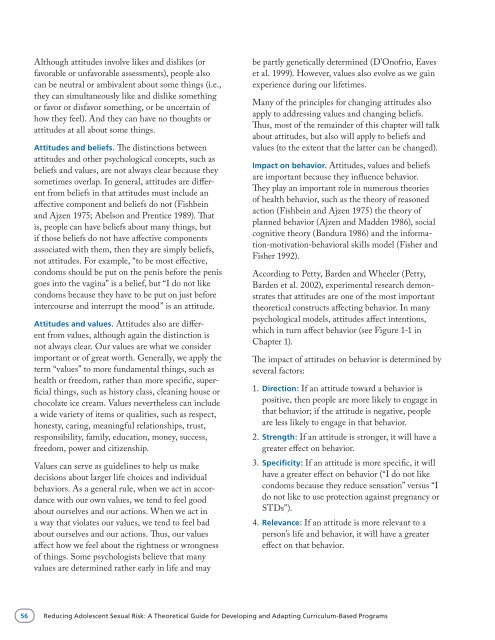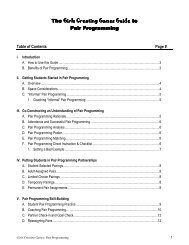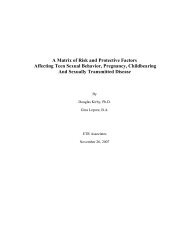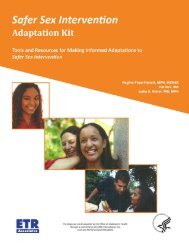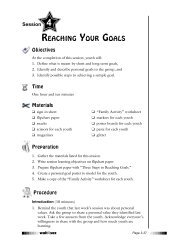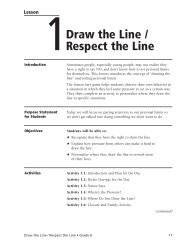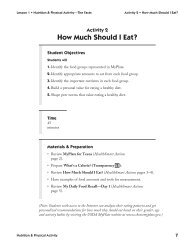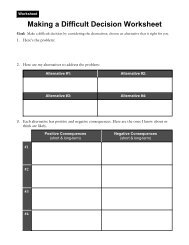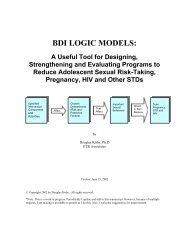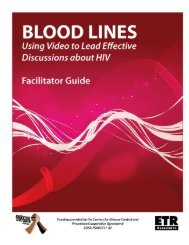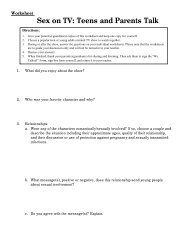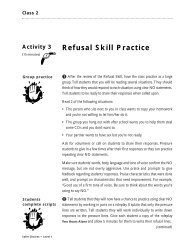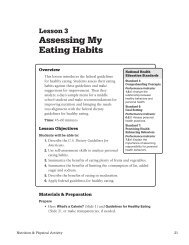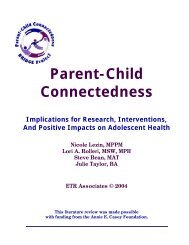Although attitudes involve likes and dislikes (orfavorable or unfavorable assessments), people alsocan be neutral or ambivalent about some things (i.e.,they can simultaneously like and dislike somethingor favor or disfavor something, or be uncertain ofhow they feel). And they can have no thoughts orattitudes at all about some things.Attitudes and beliefs. The distinctions betweenattitudes and other psychological concepts, such asbeliefs and values, are not always clear because theysometimes overlap. In general, attitudes are differentfrom beliefs in that attitudes must include anaffective component and beliefs do not (Fishbeinand Ajzen 1975; Abelson and Prentice 1989). Thatis, people can have beliefs about many things, butif those beliefs do not have affective componentsassociated with them, then they are simply beliefs,not attitudes. For example, “to be most effective,condoms should be put on the penis before the penisgoes into the vagina” is a belief, but “I do not likecondoms because they have to be put on just beforeintercourse and interrupt the mood” is an attitude.Attitudes and values. Attitudes also are differentfrom values, although again the distinction isnot always clear. Our values are what we considerimportant or of great worth. Generally, we apply theterm “values” to more fundamental things, such ashealth or freedom, rather than more specific, superficialthings, such as history class, cleaning house orchocolate ice cream. Values nevertheless can includea wide variety of items or qualities, such as respect,honesty, caring, meaningful relationships, trust,responsibility, family, education, money, success,freedom, power and citizenship.Values can serve as guidelines to help us makedecisions about larger life choices and individualbehaviors. As a general rule, when we act in accordancewith our own values, we tend to feel goodabout ourselves and our actions. When we act ina way that violates our values, we tend to feel badabout ourselves and our actions. Thus, our valuesaffect how we feel about the rightness or wrongnessof things. Some psychologists believe that manyvalues are determined rather early in life and maybe partly genetically determined (D’Onofrio, Eaveset al. 1999). However, values also evolve as we gainexperience during our lifetimes.Many of the principles for changing attitudes alsoapply to addressing values and changing beliefs.Thus, most of the remainder of this chapter will talkabout attitudes, but also will apply to beliefs andvalues (to the extent that the latter can be changed).Impact on behavior. Attitudes, values and beliefsare important because they influence behavior.They play an important role in numerous theoriesof health behavior, such as the theory of reasonedaction (Fishbein and Ajzen 1975) the theory ofplanned behavior (Ajzen and Madden 1986), socialcognitive theory (Bandura 1986) and the information-motivation-behavioralskills model (Fisher andFisher 1992).According to Petty, Barden and Wheeler (Petty,Barden et al. 2002), experimental research demonstratesthat attitudes are one of the most importanttheoretical constructs affecting behavior. In manypsychological models, attitudes affect intentions,which in turn affect behavior (see Figure 1-1 inChapter 1).The impact of attitudes on behavior is determined byseveral factors:1. Direction: If an attitude toward a behavior ispositive, then people are more likely to engage inthat behavior; if the attitude is negative, peopleare less likely to engage in that behavior.2. Strength: If an attitude is stronger, it will have agreater effect on behavior.3. Specificity: If an attitude is more specific, it willhave a greater effect on behavior (“I do not likecondoms because they reduce sensation” versus “Ido not like to use protection against pregnancy orSTDs”).4. Relevance: If an attitude is more relevant to aperson’s life and behavior, it will have a greatereffect on that behavior.56 <strong>Reducing</strong> <strong>Adolescent</strong> <strong>Sexual</strong> <strong>Risk</strong>: A <strong>Theoretical</strong> Guide for Developing and Adapting Curriculum-Based Programs
Theories ofAttitude ChangeAttitudes sometimes change with new informationand experience. They can be influenced by parents,teachers, peers, religion, media, culture andother environmental influences, as well as personalexperience.Theories of attitude change can be used to intentionallychange attitudes about many things. However,in the field of public health, they are most commonlyused to change attitudes about one or morehealth behaviors. The examples used hereafter willinvolve attitudes about health behavior.Theories of attitude change expanded a few decadesago after health promotion interventions designedto increase knowledge and thereby change behaviorfailed to have an impact on behavior. Subsequently,researchers and practitioners became more interestedin how interventions designed to persuade people tochange their behavior actually affected their cognitiveprocesses. Early research studies found thatfactors thought to influence persuasion had differenteffects in different situations.The Elaboration Likelihood Model (ELM) (Petty,Barden et al. 2002) was one of the first modelsto fully recognize that there are many pathwaysthrough which interventions can change attitudesand that these pathways fall along an elaborationcontinuum. At one end of the continuum are processesthat require careful thinking about the argumentsin a communication message as a responseto that message (high elaboration). 7 This is calledthe central route. At the other end of the continuumare those processes that do not require much or anythinking (low elaboration). This is called the peripheralroute (see Figure 5-1).Central route. According to psychologists, thecentral route involves careful consideration of the7 “Messages” and “arguments” are used somewhat interchangeablyin this chapter. However, sometimes “messages” refers to admonitionsto engage in particular behavior conducive to public health and “arguments”refers to the reasons to engage in health-promoting behaviorand to avoid risk behaviors.information in a message about behavior, comparesthat information to knowledge already known aboutthat behavior and integrates it. This considerationprocess generates positive or negative thoughts thataffect attitudes and thereby change behavior. Forexample, new information about the likelihoodof unintended pregnancy, if sexually active, maygenerate positive or negative thoughts about havingunprotected sex. Whether the thoughts are positiveor negative determines whether the attitude changeis positive or negative. The extent to which thethoughts are either more positive or negative determinesthe amount of attitude change.According to Petty et al. (2002), two conditionsare necessary for any conscious cognitive processingrequiring some effort. First, an individual mustbe able to think about and process the information.This ability may be affected by a variety of factorsinvolving the cognitive development of the individual,the individual’s mental state (e.g., in a clearstate of mind or under the influence of drugs), thecharacteristics of the message (e.g., whether theindividual can understand the words being used),the control that the individual has over the process(e.g., whether the individual can review material athis/her discretion), the environment (e.g., the existenceand magnitude of distractions), the number oftimes the information is presented and other factors.For example, using understandable language,self-pacing, and removing distractions can increase aperson’s ability to thoughtfully consider messages.Figure5-1Peripheral RouteLow elaborationRequires little orno thinkingCentral RouteHigh elaborationRequires carefulconsiderationSecond, an individual must be motivated to thinkabout and process the information. This motivationmay be affected by characteristics of the individual(e.g., the general inclination of an individualto think about and process new information); theChapter 5 Addressing Attitudes, Values and Beliefs 57
- Page 1:
Reducing AdolescentSexual RiskA The
- Page 4 and 5:
ETR Associates (Education, Training
- Page 6 and 7:
AcknowledgmentsThis book evolved ou
- Page 8 and 9:
Activities, Boxes and FiguresActivi
- Page 11 and 12:
1 IntroductionThis book was created
- Page 13 and 14:
• Children of teenage mothers are
- Page 15 and 16: Table1-2 The 17 Characteristics of
- Page 17: Each of the following chapters focu
- Page 20 and 21: “determinants,” “behaviors,
- Page 22 and 23: model, provide evidence regarding h
- Page 24 and 25: to avoid unwanted sex and then synt
- Page 26 and 27: Figure2-3 An Example of a Logic Mod
- Page 28 and 29: Figure2-3 An Example of a Logic Mod
- Page 30 and 31: Figure2-3 An Example of a Logic Mod
- Page 32 and 33: Table2-2Learning Objectives to Redu
- Page 34 and 35: Table2-2Learning Objectives to Redu
- Page 36 and 37: Table2-3Learning Objectives to Incr
- Page 38 and 39: Table2-4Learning Objectives to Incr
- Page 40 and 41: Table2-6Learning Objectives to Incr
- Page 43 and 44: 3 Increasing KnowledgeKeys to Incre
- Page 45 and 46: Table3-1Number of Studies Reporting
- Page 47 and 48: Box3-1Types of Activities to Increa
- Page 49 and 50: partner does not mind using a condo
- Page 51 and 52: methods more often. For example, th
- Page 53 and 54: 4ImprovingPerceptions of Risks—Bo
- Page 55 and 56: 1. Do teens’ perceptions of risk
- Page 57 and 58: a. Presentations and discussions of
- Page 59 and 60: Table4-5Examples of Items That Have
- Page 61 and 62: Pregnancy Risk Activity and Follow-
- Page 63 and 64: STD Handshake(Continued)Important C
- Page 65: 5AddressingAttitudes,Values and Bel
- Page 69 and 70: Although both quality and quantity
- Page 71 and 72: • When arguments are presented by
- Page 73 and 74: that it is possible to improve thes
- Page 75 and 76: c. Use simulations to demonstrate p
- Page 77 and 78: Table5-4Examples of Survey Items fr
- Page 79 and 80: Table5-4Examples of Survey Items fr
- Page 81 and 82: Activity 5-2Dreams, Goals and Value
- Page 83 and 84: Activity 5-4“Dear Abby”Descript
- Page 85 and 86: 6CorrectingPerceptionsof Peer Norms
- Page 87 and 88: Is there a gap between perceptions
- Page 89 and 90: 3. Use concepts, language, symbols,
- Page 91 and 92: Table6-4Examples of Items That Have
- Page 93 and 94: 7 Increasing Self-Efficacy and Skil
- Page 95 and 96: feelings may reduce their self-effi
- Page 97 and 98: situations more difficult so that t
- Page 99 and 100: paper (e.g., the air should be sque
- Page 101 and 102: Activity 7-1Lines That People Use t
- Page 103 and 104: Situations That May Lead to Unwante
- Page 105 and 106: Roleplaying to Enhance Refusal Skil
- Page 107: Activity 7-5Using Condoms Correctly
- Page 110 and 111: chaperoned, they may not have the o
- Page 112 and 113: attitudes about condoms and contrac
- Page 114 and 115: Activity 8-1Description of Activity
- Page 117 and 118:
9IncreasingParent-ChildCommunicatio
- Page 119 and 120:
ehavior may be quite complex (Jacca
- Page 121 and 122:
5. Give students multiple homework
- Page 123 and 124:
and the activities suggested prior
- Page 125 and 126:
Activity 9-1Description of Activity
- Page 127 and 128:
Activity 9-3Human Sexuality Board G
- Page 129 and 130:
10 ConclusionsKeys to Reducing Sexu
- Page 131 and 132:
Figure10-1Assessing Factors in Curr
- Page 133 and 134:
sexual minority youth and pressure
- Page 135 and 136:
Table10-1Instructional Principles I
- Page 137:
Table10-1Instructional Principles I
- Page 140 and 141:
Incidence The number of new cases o
- Page 143 and 144:
ResourcesThree kinds of resources a
- Page 145 and 146:
Science-Based Practices: A Guide fo
- Page 147 and 148:
National Longitudinal Study of Adol
- Page 149 and 150:
Changing Social Normshttp://www.etr
- Page 151 and 152:
Advocates for Youth, Young Women of
- Page 153 and 154:
ReferencesAbelson, R., and Prentice
- Page 155 and 156:
Coyle, K. (2006). All4You2! Prevent
- Page 157 and 158:
Lapsey, D.K. (1993). Toward an inte
- Page 159 and 160:
Weed, S.E., Olsen, J.A., DeGaston,


